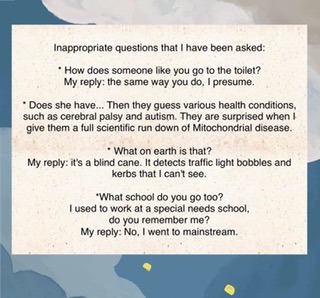Don't Assume You Know Me
Don't assume you know me.
Being visibly disabled, people assume I don't mind if they ask me totally inappropriate questions.
Perhaps people do it to make me feel uncomfortable and increase their feelings of superiority, who knows? But I’ll turn it back on them and explain how things like the body work.
I like that note of surprise as they realise, I am quite clever.
If you don't want to disclose, that's fine too, just say, 'it’s not your business.'
All of these comments hurt.
How does a complete stranger know whether I am able to work or not. How do they know if I contribute to society in other, non-typical ways? They don’t know that I have had to give up on dreams when I was younger, when I realised no one would give me a job because of my disabilities. As an employment advisor said, 'if someone took you on, they'd have to take on two people, split the shifts to help your fatigue, all for one person's job? It won’t happen.'
So, I only did college courses and voluntary work, which I love.
It's a common misconception that those unable to work just sit around all day twiddling our thumbs. Many of the disabled /chronically ill community are activists, driving change. If we don't, who else will?
It's another common misconception that a wheelchair indicates a lower intelligence. I don't understand this. It's my body that's a bit broken, legs that are wobbly, dystonia hands that are held tight, eyes that don't see, not my brain. Yes, my health issues stem from the lentiform nuclei and brain stem and other areas that contribute to muscle movement and vision. None of this affects my ability to learn and absorb information.
I am 32 and quite cognitively capable of deciding for myself who shall use my photo. I am not a child. I do not need permission from my parents for anything.
There are 'special buses ' for the elderly and disabled. I choose not to use them as when I have in the past, they were unreliable, and I was left waiting in the cold for an hour. They also only told you if the place you want to go to is on their route the day before, so making plans is impossible. Also , I found the drivers to be rude. One glanced at my mum's car on the road and asked sneeringly, 'why couldn’t your parents take you?'
'I’m trying to be independent.'
People tend to associate the wheelchair with a baby's pram and treat me like an infant. They are shocked if I swear, if I offer an adult opinion. Some will say, 'aw, isn't she a good/clever/brave.'
I feel like asking them, 'so, can you tell me where basal ganglia are in the brain and what it does?'
I remember once, I was in the park and pulled over to let a family pass on the small path, the man said to my mum, 'ah, isn't she a good girl for letting the people pass.' No, that’s just me being polite. There is a strange assumption amongst the able bodied that disabled people are selfish. We're not... Well, no more so than any other section of society.
Please stop patronising me and treat me like the 32 year old woman that I am!
You will have noticed that so far, I’ve not commented on the amount of times people talk through me, as if wheelchair= deafness. It doesn't. Referring to me as she when I am say in front of you and talking only to the person I am with, is rude and dehumanising. Talking to me in the third person makes me feel invisible. I have thoughts and opinions too. Ask me then. No one knows what goes on in my head (fortunately for them).
Although strangers ask so many inappropriate questions there are also some questions that annoyingly no one ever asks.
And it hurts!
I think in this blog post, I’ve busted some disability myths. Let’s do some more!
We disabled people are only human! Of course, we feel. The 'I’m ok' mask is one I slip on in public. Just because I laugh and smile around people, it doesn't mean I am like that all the time. I have and do get angry, sad, feel hopeless at the fact that I can't change my health situation.
We disabled people are only human, of course we feel attraction, desire and love! How do you think the next generation of disabled people arrive?
We disabled people are only human, of course it hurts to be excluded! In high school and college, I was never included in social activities. When I asked to be included, I was told no because of the wheelchair, it'd be too awkward.
Please just treat us as we are: ordinary human beings. It hurts when I see a post on social media, saying something along the lines of, 'having the best time with the best people’ everyone you know is on the photos, except you. Why?
I think I’ve rambled on long enough, so I’ll wrap up now.
To summarise:
* If you wouldn't ask a non-disabled person, don't ask a disabled person.
*Mobility aids don't indicate a learning disability. These are often invisible disabilities that aren’t highlighted by physical aids.
*Talk to the disabled person, not who they're with. Our lives are very interesting, so ask us then.
*Don’t assume you know anything about the disabled person if you’ve only just met them.
*Remember, we disabled people are only human, so treat us as such.
If you are disabled, have you had any similar experiences? If you are not disabled, how have I changed your mind on disability?







Comments
Post a Comment